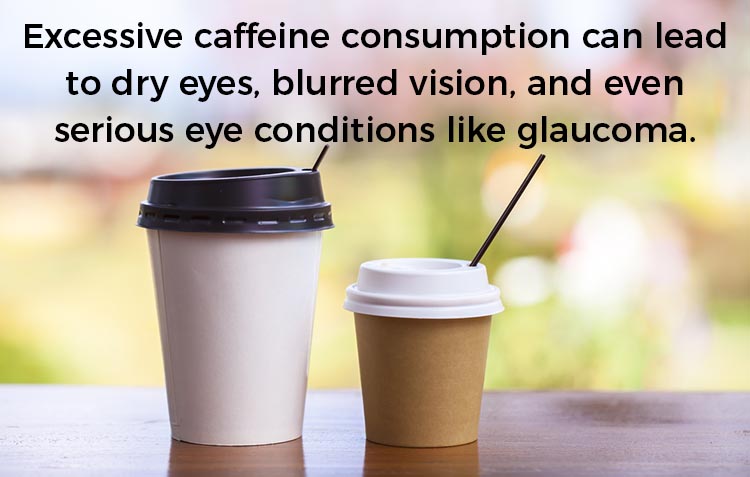Common Eye Conditions after Short-Term Caffeine Use:
When you drink too much coffee or overindulge in caffeinated energy drinks, you may experience sudden fluctuations in your blood sugar levels. This quickly translates into blurred vision, along with nausea, changes in appetite and rapid heart rate. Too much caffeine is also directly linked to involuntary twitches in the eyes or eyelids, which is known as myokymia. Though this condition isn’t painful or dangerous, it can be disruptive to daily activities.

Some individuals find that consuming large amounts of caffeine in a short period of time reduces tear production, causing dry eyes. Short-term, this condition brings some discomfort, including a burning or gritty sensation. Over time, if dry eyes are not corrected through decreased use of caffeine or medical intervention, chronic dry eyes can lead to a greater risk of eye infections, inflammation of the eyes, corneal abrasions and difficulty performing focus-intensive activities such as reading.
Eye Diseases Related to Long-Term Caffeine Use:
In addition to the temporary short-term impact on vision, there can be permanent consequences to long-term overuse of caffeine. For example, one study found that the risk of developing the degenerative eye disease glaucoma is greater in individuals who drink three or more cups of coffee per day. It causes an increase in eye pressure, which can endanger patients already suffering from glaucoma.
The research on relationships between caffeine and glaucoma is incomplete, and additional studies are needed to understand what level of consumption is safe. In the meantime, occasional caffeinated beverages are unlikely to cause long term damage, but individuals already at risk for glaucoma may wish to limit their intake.
Signs of Caffeine Overdose:
Though caffeine is found in medications, foods, and beverages that people consume on a daily basis, it should still be treated with the same caution as any other drug. Overuse does come with health risks, and in extreme cases, overdoses can be dangerous. General recommendations suggest no more than 400 milligrams (mg) of caffeine per day for healthy adults. However, you should speak with your physician for information specific to your situation. Four cups of coffee, two energy shots or ten cans of soda equal approximately 400 mg of caffeine, but bear in mind that you can unintentionally exceed this amount if you combine medication containing caffeine with caffeinated foods or drinks.
Many people suffering from caffeine overdose report seeing flashes of light. Other symptoms include trouble breathing, convulsions, dizziness, fever, increased thirst, hallucinations and rapid or irregular heartbeat. If you experience these symptoms, seek emergency care immediately.
Cutting caffeine out of diets completely is a deal-breaker for coffee connoisseurs. Fortunately, for most people, this drastic step is not necessary for keeping your eyes healthy. The most common eye problems related to caffeine are brought on by excessive use – not drinking a cup or two of coffee to start your day. However, if you experience changes in your vision, it is important make an appointment with your ophthalmologist right away.